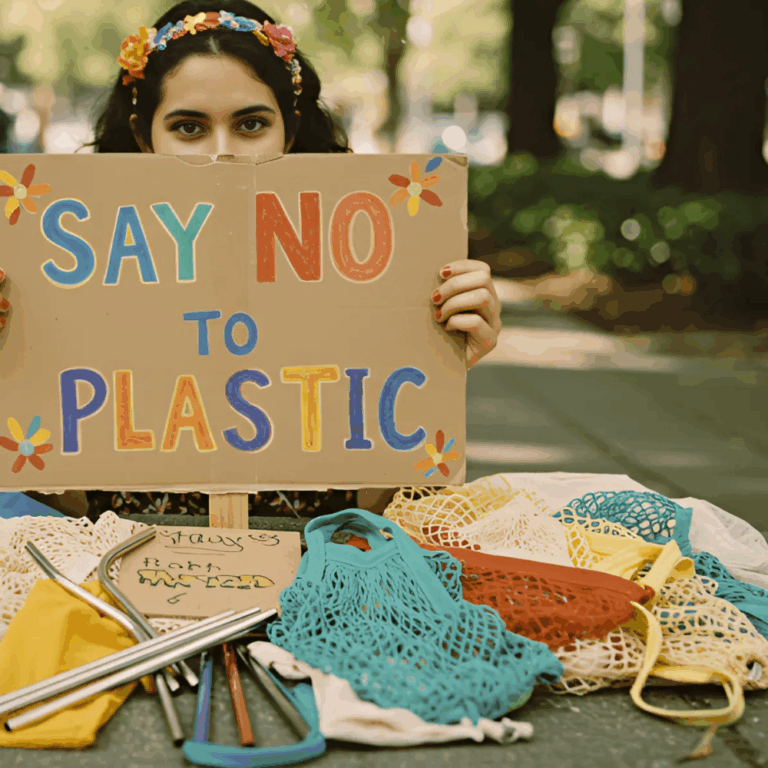
The average American generates 4.9 pounds of waste daily1 that’s over 1,700 pounds a year, roughly the weight of a small car! Now, imagine every household in the U.S. doing the same. That’s a mountain of trash, much of it unnecessary.
The way we shop plays a significant role in that waste, but with a few simple changes to your grocery routine, you can cut down on trash and save money at the same time. From skipping plastic-wrapped produce to embracing reusable containers, zero-waste grocery shopping isn’t about perfection but making more intelligent, more intentional choices. And the best part? Many of these changes simplify your life and keep more cash in your pocket.
I’m not a zero-waste expert, but I’m always learning and working to reduce waste in my home especially when cutting out plastic. It’s a journey, and I’m figuring out the best ways to make sustainable choices that stick.
What is Zero Waste Shopping?
Zero-waste shopping is about making mindful choices to reduce the amount of trash and unnecessary packaging that comes with buying groceries. Instead of relying on single-use plastics, individually wrapped produce, and excessive packaging, it focuses on buying in bulk, choosing reusable containers, and supporting local, sustainable food sources.
The goal isn’t perfection it’s about minimizing waste wherever possible. This means bringing your own bags and containers, opting for fresh and package-free produce, and shopping at places that offer bulk goods or sustainable alternatives. This reduces household waste and helps cut down on food waste, supports local businesses, and even saves money in the long run.
Essential Zero Waste Shopping Prep
Some prep work can make all the difference before you enter a store. Zero-waste grocery shopping isn’t just about where you shop it’s about how you shop. A solid plan helps you avoid unnecessary waste, stick to your budget, and maximize your reusable supplies.
1. Take Inventory Before You Shop
One of the most significant sources of food waste is overbuying. Before making a grocery list, stock what’s already in your pantry, fridge, and freezer. This prevents duplicate purchases and helps you use up what you have first.
2. Know Where to Shop
Not all stores are created equal when it comes to waste-free options. Farmers markets, co-ops, and bulk stores often have more plastic-free options than conventional grocery chains. Some key places to look:
- Farmers market: Great for fresh, local produce, often without plastic packaging. Many vendors are happy to place items directly into your reusable bags.
- Bulk stores and co-ops: Some stores allow you to bring your own containers for grains, nuts, spices, and even liquids like oils or honey.
- Local bakeries and butchers: Many will let you bring your own reusable bread bag or container for meats and cheeses.
Check online for stores in your area offering bulk shopping or sustainability initiatives. ZeroWasteStore is a fantastic online shop dedicated to providing eco-friendly and sustainable products. Their wide selection of items, from household essentials to personal care products, ensures customers can find everything they need for a zero-waste lifestyle.
3. Bring the Right Reusable Supplies
A successful zero-waste shopping trip requires the right gear. Packing a few essentials ensures you won’t rely on plastic packaging at checkout. What to bring:
- Reusable shopping bags for carrying everything home
- Cloth produce bags for fruits, vegetables, and bulk dry goods
- Glass jars or containers for bulk pantry items, deli purchases, and liquids
- Beeswax wraps or silicone bags for cheese and other small loose items
- A lightweight tote or basket to carry your items without needing a store-provided bag
Many bulk stores have a “tare weight” system, allowing you to weigh your empty container before filling it, so you only pay for the contents.
4. Plan Your Budget for Zero Waste Shopping
A common myth is that zero-waste shopping is expensive, but buying in bulk and skipping brand-name packaged goods can actually save money. The key is to plan and focus on value.
- Compare price per ounce/pound. Bulk items often cost less than their packaged counterparts.
- Prioritize essentials. Before overhauling your grocery routine, swap out high-waste staples like grains, pasta, and snacks.
- Invest in reusable gear over time. If you don’t have all the supplies yet, start small. A few reusable produce bags or a set of glass jars go a long way.
Must-Have Zero Waste Shopping Tools
If you’re ready to embrace zero-waste grocery shopping, it’s all about the right tools for the job. These essentials will help you shop wiser, waste less, and organize your kitchen. Here’s what you need in your zero-waste shopping toolkit:
Best Containers for Different Grocery Items
Not all containers are created equal, especially when it comes to holding your groceries! Glass jars or sturdy metal containers are perfect for dry goods like grains, pasta, and nuts. Glass or silicone containers work wonders for wet items like oils, honey, or even soup.
tip
Mason jars are your best friend!
They’re versatile, stackable, and easy to clean. For heavier items like liquids or fresh deli goods, silicone bags or glass bottles do the trick without any plastic waste.
Alternatives to Produce Bags
Those flimsy plastic produce bags? They’re easily avoidable with a few sustainable swaps. Try cloth produce bags made of cotton or mesh for fruits and veggies. They’re lightweight, washable, and durable, plus they don’t end up in a landfill. A reusable tote or basket can be a lifesaver if you need a heavier bag for items like leafy greens.
Cleaning and Maintaining Your Jars and Containers
Once you’ve invested in your reusable containers, it’s important to keep them in top shape! Glass and metal containers clean easily with warm, soapy water, but make sure to give your silicone bags a good rinse and dry thoroughly to avoid any lingering smells. You can even use a small bottle brush to reach those tricky spots in jars. Keeping them clean and well-maintained ensures they last longer and stay ready for your next shopping trip.
Digital Receipt Options
Cut down on paper waste by choosing digital receipts whenever possible. Many stores now offer the option to email or send your receipt to your phone. This simple swap reduces paper waste and keeps everything neatly stored on your device, ready for reference.
Plus, did you know that receipts often contain harmful chemicals like BPA and BPS, which are not only bad for your health but can also contribute to microplastic pollution? By opting for digital receipts, you’re avoiding these chemicals altogether.
Navigating Bulk Shopping Successfully
Shopping in bulk is one of the most effective ways to cut down on packaging waste, but it can also be intimidating if you’re new to it. Don’t worry, once you know how to navigate bulk shopping successfully, it’ll become second nature. Here are a few tips to help you make the most of those bulk aisles and quickly reduce waste.
Finding Bulk Sections in Regular Stores
Not all grocery stores are fully dedicated to bulk, but many have bulk sections for dry goods like grains, pasta, spices, nuts, and even certain liquids. These sections are usually located near the produce aisle or in the natural foods area. If you’re shopping at a store that doesn’t have a large bulk section, check out its co-op or organic section some stores may also offer bulk offerings in refrigerated or frozen areas.
Understanding Weight Tracking Systems
Most bulk items are sold by weight, and understanding the weight system is crucial to avoid overpaying. Bulk bins typically have a tare weight, which is the weight of your container before it’s filled. Before filling your container, weigh it (often on a nearby scale) and subtract the tare weight from the total weight of your purchase. This ensures you only pay for the contents.
Many stores have easy-to-use barcode labels or stickers on which you can write the tare weight. When you check out, the cashier will subtract that weight automatically. If you’re bringing your own jars or containers, remember to weigh them before you fill them up and label them clearly so they don’t get mixed up with other shoppers’ items.
Proper Container Tare Process
Always follow the tare process to ensure you’re paying for only what you’re purchasing. Here’s how it works:
- Weigh your empty container on the store’s scale.
- Record the tare weight by writing it on a sticker or using the scale’s printout label.
- Fill your container with the bulk item of your choice.
- At checkout, the cashier will deduct the tare weight, ensuring you’re only charged for the product.
Using this process prevents paying for the weight of your container and keeps your shopping trip waste-free.
Bulk Bin Hygiene Practices
Regarding bulk bins, cleanliness is key not just for your health but to ensure the food stays fresh and uncontaminated. Here are a few practices to keep in mind:
- Use clean containers: Always bring your own clean and dry containers. This helps prevent moisture buildup and contamination.
- Keep your hands clean: Use the provided scoops or tongs to grab items from the bulk bin, or even bring your own reusable scoop for extra peace of mind.
- Check expiration dates: While bulk items typically have a longer shelf life, always check any posted expiration or best-before dates, especially for nuts or grains.
- Cover your containers: If you bring your jar or bag, make sure it’s securely closed once filled. This helps prevent spills and keeps everything clean.
Fresh Produce Zero Waste Strategies
Adopting zero-waste strategies for fresh produce can make a huge impact on reducing overall waste. From choosing the right items to extending their shelf life, here are some tips to help you shop smarter, save money, and reduce plastic waste while still enjoying the fresh fruits and veggies you love.
Seasonal Shopping Benefits
Shopping for seasonal produce isn’t just great for the environment it’s also better for your wallet. Seasonal fruits and vegetables are typically grown locally, requiring less transportation and packaging, reducing their carbon footprint. Plus, they’re often fresher, tastier, and more affordable in season.
For example, in the summer, you might find an abundance of berries, tomatoes, and cucumbers, while autumn brings apples, squash, and root vegetables. Eating with the seasons allows you to enjoy a variety of fresh produce year-round while minimizing food miles and packaging.
Package-Free Produce Selection
One of the easiest ways to reduce waste is to skip the pre-packaged produce. Look for items not wrapped in plastic, like loose bananas, oranges, potatoes, and carrots. Instead of grabbing those pre-packaged bags of pre-washed lettuce, buy whole heads or leafy greens and wash them yourself at home.
Many grocery stores and farmers markets allow you to fill up your own bags or containers with fruits and veggies, saving you from single-use plastic. If you need to buy something like berries that typically come in containers, look for compostable or recyclable options whenever possible.
Storage Techniques for Longer Shelf Life
While shopping for fresh produce, it’s essential to think about how to store your items to keep them fresh for as long as possible. Here are a few storage techniques to extend the shelf life of your fruits and veggies:
- Use breathable bags: For greens, herbs, and mushrooms, use perforated produce bags or cloth bags that allow airflow.
- Proper refrigeration: Store fruits and vegetables that require cold storage, like berries, leafy greens, and most berries, in the fridge. Remember that some fruits, like tomatoes and avocados, should be left out to ripen before refrigerating.
- Keep ethylene-producing fruits away from other produce: Certain fruits, such as apples, bananas, and avocados, produce ethylene gas, accelerating ripening in nearby fruits and vegetables. To prevent spoilage, store these items separately.
- Store potatoes, onions, and garlic in a cool, dark place: These staples last longer when stored away from sunlight in a dry, ventilated area.
Pro Tip: Consider storing herbs, lettuce, and leafy greens in glass jars, which help maintain freshness for longer. You can even repurpose mason jars for this!
Working with Local Farmers
Supporting local farmers isn’t just great for your community—it’s also a fantastic way to minimize waste. Local farmers markets are often a hub for package-free produce, where you can find fresh, seasonal items straight from the farm. By building relationships with local farmers, you can often get produce that is less likely to be pre-packaged and might even be available for purchase in bulk or by weight.
Pro Tip: Ask your local farmers if they offer any bulk produce discounts or if they’ll let you bring your containers to fill, saving you money and waste.
Handling Challenging Items
Some items, like meat, dairy, and products with specialized packaging, can be trickier to shop for in a zero-waste manner. While it may take more effort to find suitable alternatives, plenty of solutions help you reduce waste without compromising on your needs. Here’s how to navigate these more challenging items in your zero-waste journey.
Solutions for Meat and Dairy
Meat and dairy can be challenging to purchase without packaging, but there are ways to make these products more sustainable:
- Bring Your Own Containers: Many butcher shops or grocery stores with a butcher counter will allow you to bring your own reusable containers for meats and cheeses. Ask the butcher to weigh your container before filling it up.
- Buy in Bulk or Larger Quantities: Purchasing more significant cuts of meat or bulk cheeses often results in less packaging. You can freeze portions of meat or cheese at home to extend shelf life and avoid wasting food.
- Explore Local Farms and Co-ops: Local farms or cooperatives may offer dairy products in glass bottles or jars, and they often have direct relationships with customers, allowing you to bring your own containers for meat and other items.
- Look for Plastic-Free Options: Some specialty stores now offer butcher paper-wrapped meats, which are much better than plastic packaging. Some dairy products, particularly milk, butter, and cream, also come in glass bottles.
Pro Tip: If you can, switch to plant-based dairy alternatives like oat or almond milk, which often come in more eco-friendly packaging like cartons or glass bottles.
Alternatives for Typically Packaged Items
Some grocery staples are notorious for their plastic packaging, but many stores now offer eco-friendly alternatives for items you’d typically find wrapped in plastic:
- Dry Goods: Many bulk stores allow you to fill your containers with staples like pasta, rice, flour, and cereal. Check out the bulk bins for these products and avoid plastic bags.
- Frozen Foods: Frozen vegetables, fruits, and other items often come in plastic bags or boxes, but you can buy many frozen items in bulk if your store offers them. Alternatively, buy fresh produce in season, chop it, and freeze it yourself in reusable bags.
- Canned Goods: If you avoid canned goods, consider fresh produce or dried alternatives for beans, tomatoes, and fruits. If you buy canned items, look for those in cans with no BPA lining, or choose glass jar options when possible.
Pro Tip: Look for stores that offer reusable glass jars for items like peanut butter or honey—they’re great alternatives to single-use plastic containers.
Special Dietary Requirements
Suppose you follow a special diet whether gluten-free, dairy-free, vegan, or any other—zero-waste shopping can require extra consideration. Luckily, there are increasingly more options for individuals with dietary restrictions that minimize waste.
- Gluten-Free and Vegan Options: Many gluten-free and vegan products now come in bulk at specialized stores. Bulk bins often carry dried grains, legumes, nuts, and even plant-based flours, which can be used for gluten-free or vegan recipes. For packaged items, try looking for products with minimal or recyclable packaging.
- Allergen-Free and Specialty Foods: For individuals with specific allergies or sensitivities, it’s worth seeking out local stores or co-ops specializing in allergy-friendly or health-conscious options. These stores offer a wider range of bulk and package-free products, and some are even willing to work with you to refill your containers for niche items like gluten-free flours or nut butters.
Compromise Strategies
Adopting an utterly zero-waste lifestyle is a significant shift, and sometimes it’s okay to compromise, especially when it comes to harder-to-find items. Here are some strategies to ease into zero-waste shopping without feeling overwhelmed:
- Embrace Reusable Packaging: While some items may need to come in packaging, you can significantly reduce waste by focusing on reusable packaging options, like glass jars, stainless steel containers, or beeswax wraps. For example, bringing a reusable container to fill your store-bought yogurt or deli meat can be a small but impactful step.
- Choose Plastic-Free Where Possible: If you can’t find a plastic-free option for every item, focus on the items you buy most often and make those the priority for zero-waste swaps.
- Prioritize Impactful Items: First, focus on high-waste items that you can easily swap, like switching from plastic water bottles to reusable bottles or eliminating disposable bags. Once these small victories become second nature, gradually work on more challenging items like specialty foods or packaged goods.
Pro Tip: Every little change counts! Even if you can’t go completely zero waste, reducing your consumption of plastic and packaging in any area is a step in the right direction.
Making Zero Waste Shopping Affordable
Zero waste shopping doesn’t have to break the bank. In fact, with a few savvy techniques, you can save money while reducing waste. It’s all about being intentional with your purchases, using cost-effective alternatives, and being strategic with your shopping habits. Here’s how to make zero-waste shopping work for your wallet without sacrificing quality or sustainability.
Price Comparison Techniques
One of the best ways to keep your zero-waste shopping budget in check is by comparing prices before purchasing. Prices can vary significantly between stores, even for similar products, so researching can save you money in the long run.
- Use Apps and Websites: Some apps and websites allow prices to be compared across local stores or online markets. These can help you find the best deals on zero-waste essentials like dry goods, cleaning supplies, and toiletries.
- Olio is a community-sharing app that helps pass on items you no longer need to others nearby. Its mission is to reduce waste and foster community by giving things a second life.
- Too Good To Go is a social impact company that reduces food waste by connecting consumers with surplus food from local stores, cafes, and restaurants.
- Flashfood is an app that lets you save money on groceries by purchasing surplus food from local stores at a discounted price. It helps you stock up on fresh items for less and plays a key role in reducing food waste by connecting you with products that would otherwise go unsold.
- Check Unit Prices: Don’t just look at the price tag; compare the unit prices (price per ounce, liter, etc.). Often, buying in bulk or larger quantities can save you more money over time.
- Track Sales and Discounts: Many stores have periodic sales or clearance sections where you can score zero waste items like glass jars, reusable containers, or cleaning products at a discount. Keep an eye on these deals, especially at eco-friendly stores.
Bulk Buying Cost Analysis
Buying in bulk is one of the best ways to save money and reduce waste, but it’s essential to do a cost analysis to ensure you’re getting the best deal.
- Calculate Cost Per Use: Buying in bulk is not always about the upfront price. You need to break down the cost per use or weight to see if buying bulk makes sense. For example, buying 10 pounds of oats may seem like a lot, but it’s much cheaper than buying individual packages every week.
- Avoid Overbuying: While bulk buying is usually cheaper, buying only what you’ll use is essential. Overbuying can lead to waste if products go bad before you use them. It’s worth checking if you can store bulk items properly to ensure they don’t spoil quickly.
- Check for Discounts: Some stores offer bulk discounts for larger quantities, so make sure you’re taking advantage of those savings. Also, check if a membership or loyalty program provides additional savings for bulk purchases.
This Was About Zero Waste Grocery Shopping
By transforming your shopping routine into a more sustainable practice, you’ll help the environment and save money. Start small, focus on one section of your grocery list at a time, and gradually expand your zero-waste efforts as you go. Remember, even the tiniest changes can make a huge difference over time. So, let’s take these steps together and create a more eco-friendly shopping experience, one conscious choice at a time!
References
- U.S. Environmental Protection Agency. (n.d.). National overview: Facts and figures on materials, waste, and recycling. Retrieved from https://www.epa.gov/facts-and-figures-about-materials-waste-and-recycling/national-overview-facts-and-figures-materials ↩︎






